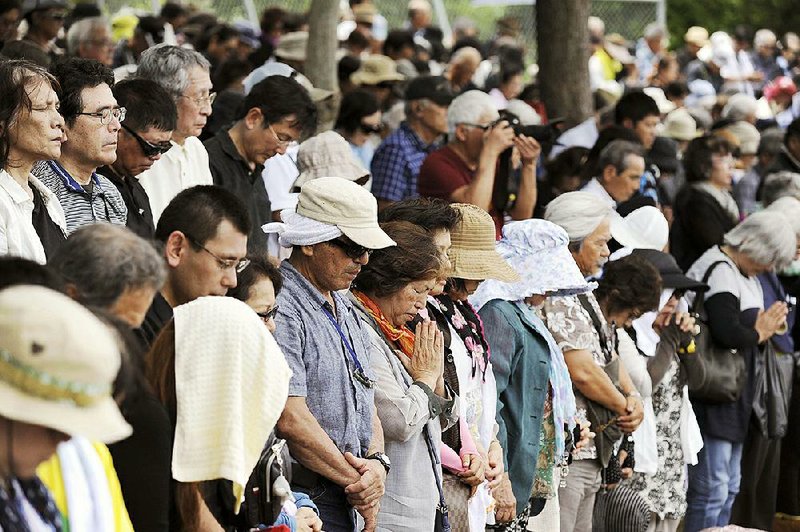TOKYO -- Tens of thousands of people on the Japanese island of Okinawa protested Sunday against the presence of U.S. military bases there, with many demonstrators wearing black to mourn the rape and killing of an Okinawa woman in which an American contractor is a suspect.
The rally called for a review of the U.S.-Japanese security agreement, which requires Okinawa to host about half the U.S. soldiers and sailors stationed in Japan. Of the acreage in Japan taken up by U.S. bases, about three-quarters is on the island.
Also contentious is a plan to relocate a Marine Corps air station to a less-populated part of the island. The relocation plan developed after public anger over the 1995 rape of a 12-year-old girl by three American servicemen.
The killing of the woman this year angered many in Okinawa, where tensions periodically run high over crime linked to American troops. The woman had been missing for several weeks when her body was found last month. The U.S. contractor, a former Marine, was arrested May 19 on suspicion of abandoning the woman's body but has not yet been charged with killing her.
Okinawa Gov. Takeshi Onaga told the crowd at the rally in Okinawa's capital, Naha, that he wanted to apologize to the slain woman for failing to protect her after what happened in 1995.
"We had pledged never to repeat such an incident," he said. "I couldn't change the political system to prevent that. That is my utmost regret as a politician and as governor of Okinawa."
Onaga has said he wants the U.S. military footprint reduced, and he's not alone. In Okinawa elections this month, voters gave an expanded majority in the Okinawa Prefectural Assembly to politicians who oppose the airfield and want to reduce the U.S. military presence.
About 65,000 people attended the rally, according to the Kyodo News agency. Organizers called it the largest demonstration against the U.S. presence in Okinawa in two decades. Many people held signs demanding that the Marines leave and that the overall military presence on Okinawa be scaled back.
About 1.4 million people live on Okinawa. Among them are roughly 50,000 Americans, the majority connected to the military.
Prime Minister Shinzo Abe's government is behind the security agreement with the U.S., and he wants Japan to take a bigger military role on the international stage. Abe has been working to strengthen ties with Washington, and he argues that any perceived weakening of the alliance would embolden Japan's regional rival, China.
But those at the rally said they wanted a more peace-oriented Japan.
"This is not how we want the country to be," said university student Jinshiro Motoyama. "We want the bases gone."
A rally was also held in front of the prime minister's residence in Tokyo. It drew about 10,000 people and was timed to coincide with and show support for the Okinawa rally.
The U.S. military has periodically tried to ease tensions on Okinawa, and it says the crime rate among its ranks is lower than among the general public.
Earlier this month, the U.S. Navy imposed a drinking ban after an American sailor was arrested on suspicion of drunken driving on Okinawa, driving the wrong way on a freeway and crashing into two vehicles, injuring two people. The restriction was recently eased.
U.S. forces on Okinawa are also under a curfew, billed by their commanders as a mourning period, for 30 days in response to the recent killing. They must be back on their bases or at home at night.
Last month, Lt. Gen. Lawrence Nicholson, the commanding general of Marine Forces Japan, stressed the importance of the alliance. "Please do not allow this terrible act of violence to drive a wedge between our two communities," he said on Okinawa, referring to the woman's death. "There may be issues we differ on. But we must continue to talk. Let's keep those lines of communication open."
But Jeff Kingston, a professor of Asian history at Temple University in Tokyo, said resentment about the bases will likely continue on Okinawa, adding that he believes the base relocation project may be delayed.
"I think they just feel so frustrated," he said of residents of Okinawa. "These protests are not just going to go away."
Information for this article was contributed by Yuri Kageyama, Koji Ueda and Kaori Hitomi of The Associated Press and by Jonathan Soble of The New York Times.
A Section on 06/20/2016

